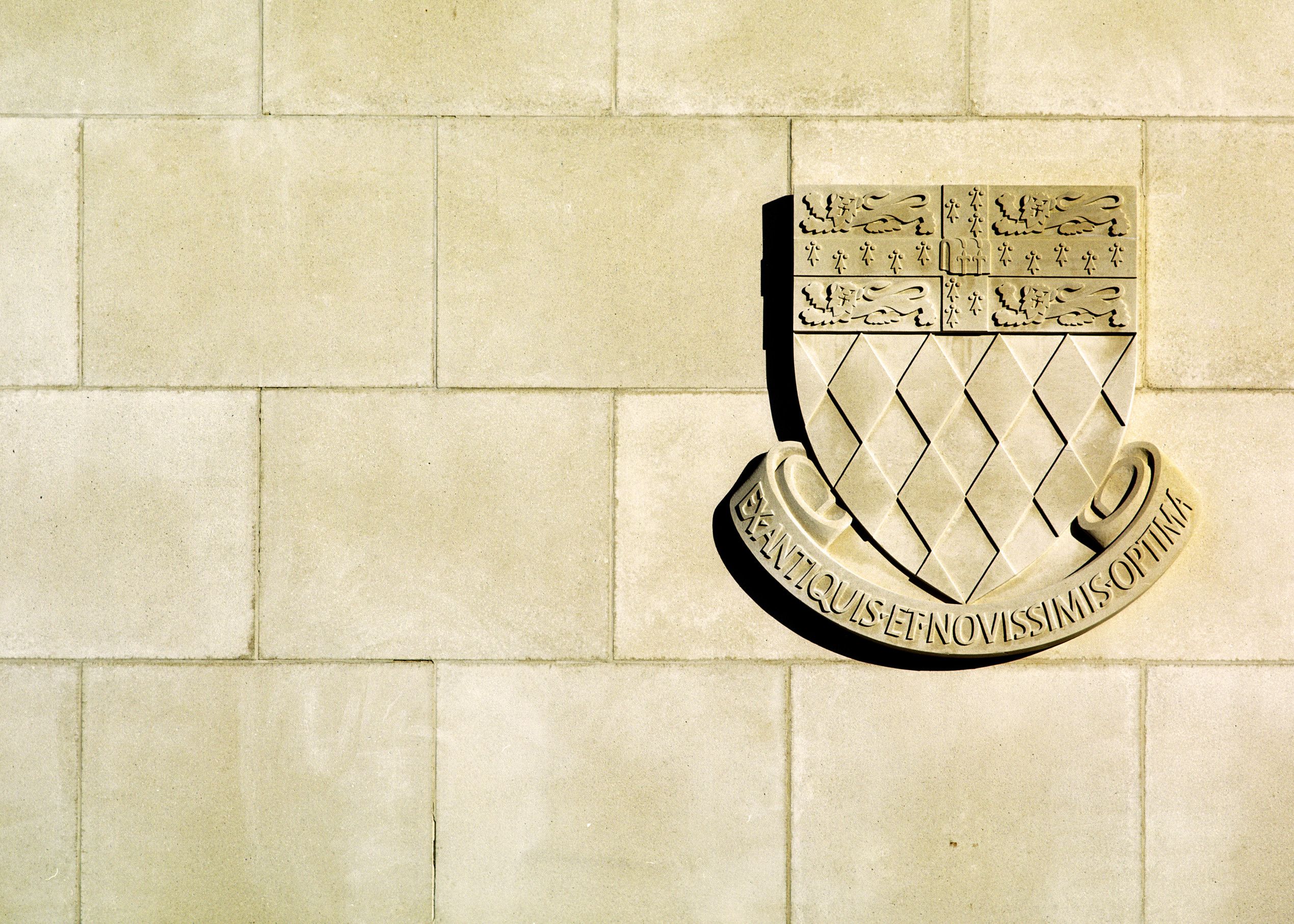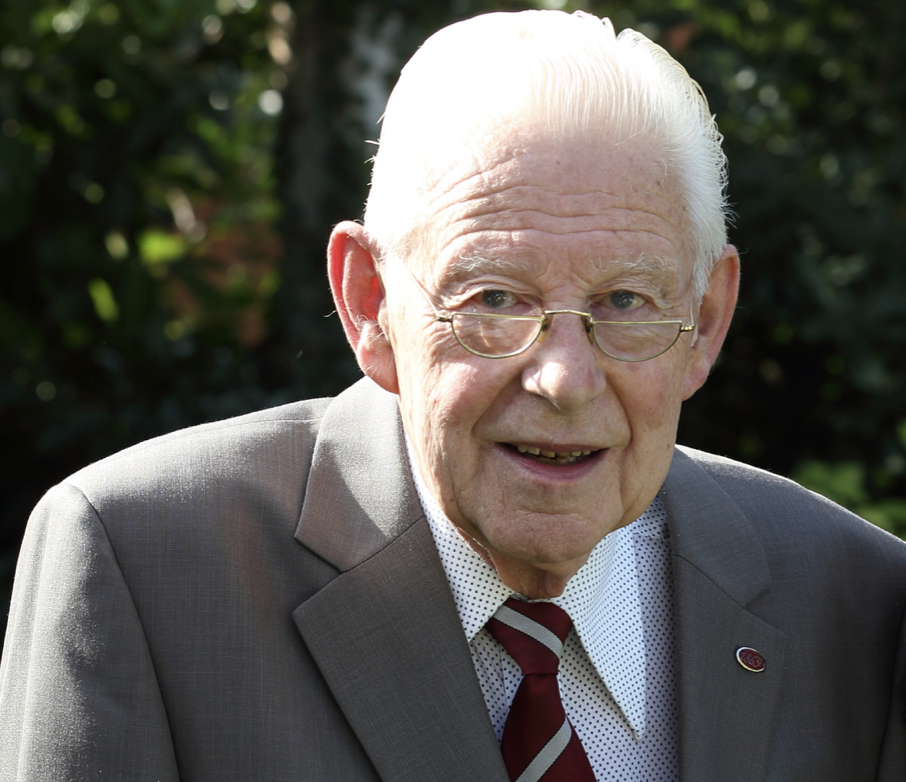Dr Geoffrey Walker

Professor Robert Lethbridge remembers his colleague and friend, Dr Geoffrey Walker:
Geoff Walker, Life Fellow of the College, died in Cambridge on 22 August 2023, aged 87. He was one of the last surviving members of the small group of Fellows elected to reinforce Fitzwilliam’s teaching capacity in the immediate aftermath of it achieving collegiate status in 1966. Geoff’s Fitzwilliam roots, however, predate that crucial moment in the College’s history. He came up to Fitzwilliam House, as it then was, in 1955 to read Modern Languages. Graduating in 1958, he stayed on as a research student in Spanish, completing his PhD in 1963.
The span of Geoff’s association with Fitzwilliam is unequalled. It was fitting that his funeral should have been held in the Chapel on 26 September 2023, almost exactly a year after that, also there, of his beloved Anna. Her exceptional inclusion in the previous Journal’s obituary notices testifies to her own contribution to the College community over the decades, familiar to successive cohorts of Fitzwilliam Modern Linguists who got to know her almost as well as Geoff. At his funeral, there was a moving tribute from John Latham (MML, 1975). This was reinforced at the Memorial Service for Geoff on 22 March 2024. Whatever else was said at this occasion, the most powerful tribute to his life and work was the presence of so many other former students (a number of them coming from over the Atlantic) squeezed into the Chapel alongside friends, Fellows and former colleagues across the University.
One of the most distinguished of the latter was Professor Chris Pountain, representing the Faculty, who recalled that, as a freshman, he had been supervised by Geoff 58 years ago. Geoff had been appointed to a lectureship in the Dept. of Spanish in 1962. He was an outstanding linguist, having honed his oral and written fluency during his tenure of a British Council postgraduate scholarship and as an English Lector at the University of Madrid in 1958–59. His many roles in the University, gratefully evoked by Chris Pountain, included Geoff’s heading with tact and diplomacy the newly constituted Dept. of Spanish and Portuguese in the early 1990s. Geoff’s most lasting contribution to scholarship is his Spanish Politics and Imperial Trade, 1700–1789, which remains a standard text in English-speaking universities across the world and (in its translated version) in Spain itself.
His principal legacy will remain, however, his establishment of Catalan as an integral part of the study of Iberian history and culture. In his University post, he succeeded Josep Maria Batista i Roca, the eminent Catalan politician and academic. But Geoff gave the subject both an unprecedented Cambridge and international profile, helped by the fact that his own Catalan was as flawless as his Spanish. In Part II of the Tripos, the Catalan paper retains its popularity thanks to both his teaching and his subsequent lobbying in the Old Schools, at the Spanish Embassy and in Barcelona, to ensure that, after his retirement in 1997, this specialism would not be a victim of administrative economies. His own successors in the Faculty continue his dedication to the cause. Geoff’s publications underline it, bringing the richness of Catalan culture to a wider audience. He was a founding member of the principal international association of Catalan studies. For many years, he presided over the Anglo-Catalan Society, enhancing its prestige to the point that it was recognised by both the Ramõn Llull Prize and he himself being awarded the Creu de Sant Jordi by the government of Catalonia in 1989, when he was invited to give the annual lecture of the Catalan National Day, the Diada. Nothing is more telling of his reputation in the field than that a respectful notice of Geoff’s death should be published in four of the province’s leading newspapers.
It is testimony to Geoff’s seamless marriage of professional and College loyalties that Fitzwilliam should be particularly in debt to the above ‘legacy’. It is not fortuitous that there hangs in the College today a portrait of Batista i Roca. It was Geoff who ensured that the latter’s estate funds in perpetuity the Fellowship bearing his predecessor’s name, which has benefitted a sequence of Catalan researchers and University lectors. Geoff’s own successors in the Faculty have maintained the tradition of holding their Fellowships at Fitzwilliam. Nor is it by chance that when in 1988 Cambridge conferred honorary degrees on King Juan Carlos I of Spain (in recognition of his championing of democracy after the Franco dictatorship) and Queen Sofia, it should be Geoff who played a crucial part in organising their welcome. For his work on their behalf, he was made a Comendador de la Orden de Isabel la Católica. And, almost inevitably, given that such honorands are required to have a college affiliation, it was at Fitzwilliam that the royal couple became Honorary Fellows.
But Geoff’s contributions to the life and work of Fitzwilliam went far beyond any such publicly recognised endeavours. When first elected to a Fellowship in 1967, he was appointed Steward, at the time a thankless task involving a more direct responsibility than in the modern era for the staff in the college kitchens. He took on these onerous duties for four years in the first instance, and then again when nobody else was available. He also volunteered to act as Librarian at various points. He never declined membership of the College’s myriad committees. He was the sort of selfless colleague upon whom all colleges depend. His lifelong commitment to Fitzwilliam is best exemplified, however, by his serving as Director of Studies for more than 20 years, from 1974 onwards. Alumni seldom remember the name of the Master during their time; sometimes that of their Tutor; they never forget who was their Director of Studies. Generations of Fitzwilliam MML undergraduates are indebted to Geoff’s down-to-earth wisdom and support during their Cambridge careers. His modesty precluded him taking credit for their achievements. But he was intensely proud of, and for, them, that the College’s MML students were consistently among the best-performing Tripos results during his years in post, top in 1990 and surpassed in 1992 when 50% of our Part II candidates were awarded Firsts, including one ‘starred’ and two of them heading the class-list.
Geoff’s professionalism only partly reveals who he was as a person. When he first came up to Cambridge, it would be fair to say, he struggled somewhat. He exemplified Fitzwilliam’s adherence to ‘Widening Participation’, long before the invention or current imperative of the term. His father having died when Geoff was a boy, his humble and single-parent background was a challenge only gradually overcome. His school reference from Liverpool College was prescient in promising that ‘Walker will contribute much to Fitzwilliam and the University’. But the crusty dons of the 1950s did not always appreciate a sense of humour that has since become unforgettable. For Geoff was a raconteur sans pareil. That one was never quite sure of the veracity of his anecdotes only added to the collective mirth he so effortlessly provoked. Whether with students, Fellows, guests on High Table, or making an after-dinner speech, he was the most entertaining of all the colleagues many of us have known over the last half century. He had many other gifts too: he was a brilliant pianist, able to play in pitch darkness as a result of his ‘training’ in the dimly lit night-clubs of Madrid during his student years. He was in some ways a man of a bygone era: in his hand-written letters, prefaced by a self-deprecating apology for what he called ‘Victorian’ protocols; in the outmoded habit (now consigned to Cantab mythology) of serving a glass of sherry (!) at the collective end-of-term meetings with his students; in never failing to comment to his dining companions that he thought nouvelle cuisine was ridiculous; and, more seriously, in his belief that the prime responsibility of academics was not original research, as it tends to be nowadays, but to teach the young.
On the other hand, Geoff valued historical continuity, incarnated in his personal involvement in the past and the future of the College. Some 30 years ago, it was he who gave the first-ever Memorial Service address in the recently completed Chapel. It was here that he paid tribute to his PhD supervisor and Fellow of Fitzwilliam, the Latin-American scholar Dr Jack Street who Geoff remembered ‘first as a teacher, then as a colleague, but always as a trusted friend’. That accolade applies as much to Geoff himself, nurturing a Modern Languages tradition which his successors as Director of Studies have sustained. Those of us who knew him will have various memories of him: the gravelly warmth of his voice; his kindness; his fairness; his pipe. Those memories will be weighted, partial, impressionistic, subjective. What is certain is that Geoff will not be forgotten. For nearly 70 years, his affection for Fitzwilliam was untrammelled. It is symptomatic of his commitment to its future and its fortunes (in the widest sense) that he and Anna left a very significant part of their estate to the College for the benefit of Fitzwilliam students. The French have a marvellous euphemism for the deceased: not ‘passed (away)’ or ‘gone’ or ‘lost’, but rather disparition. Disappeared, no longer physically visible, but present in the mind’s eye. Geoff Walker may be out of sight. Many of us see him still.
Written by Professor Robert Lethbridge, Master 2005–2013, published in The Journal 2023.

